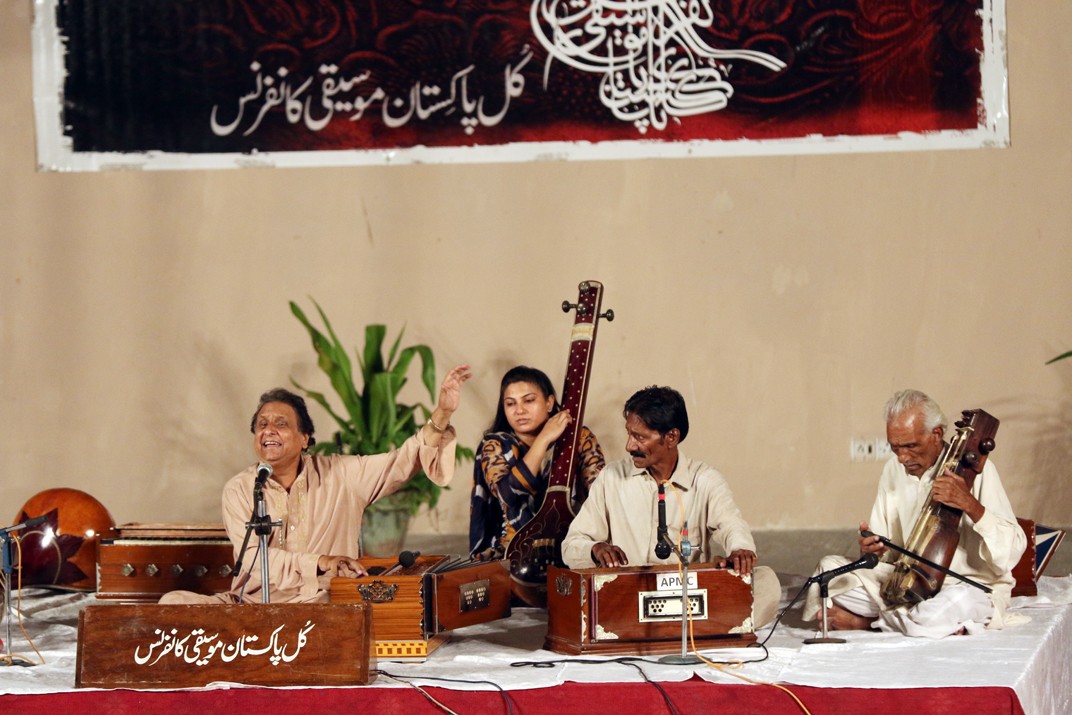
The All Pakistan Music Conference (APMC) attracted music enthusiasts back to Lawrence Gardens’ Open Air Theatre, after the event’s seven-year long disunion from its pet venue

The 2015 edition of the five-day All Pakistan Music Conference (APMC), which concluded Saturday night, at the Lawrence Gardens’ Open Air Theatre, decidedly attracted back throngs of music enthusiasts to the lush green hill top, after the prestigious event’s seven years of disunion from its historic venue.
"The event had been taking place at Alhamra Arts Council since 2008, owing to security concerns," said APMC Joint Secretary Farhan Ahmad Irfan. "The situation has improved comparatively, so the organising committee decided to shift the event back to its age-old venue.
"The response has been overwhelming," he continued, "as the Open Air Theatre can accommodate a lot more people [than Alhamra]. We can see the audiences getting excited!"
Sadaf Hanif, a visitor, spoke of "so many fond memories of the music conference events held at the Open Air Theatre. This place has its special, traditional significance, and I am glad the event is happening here again."
For the uninitiated, the APMC was set up in 1959 by Hayat Ahmed Khan, in order to promote Indian classical music. The annual festival has since become a bona fide feast for scores of music aficionados who would descend on the cultural capital of the country every year around this time. After Khan’s demise, his daughter, Ghazala Irfan, a professor at LUMS, took up the baton of a cultural impresario to advance the objectives of the conference.
This year, the conference saw a fair blend of young and veteran musicians. However, gender disparity was evident in the classical genre and solo instrumental performances. Equal representation from all the provinces of the country was observed while some artists flew in from Iran and India also.
The event opened with a singing contest among students from schools, colleges and universities competing for the Javed Qureshi Trophy, Ghazanfar Ali Trophy, Roshan Ara Begum Shield, Syed Wajid Ali Trophy and Jamil Mazhar and Mazari Medals. Amateur singers competing for the Hayat Ahmed Khan Trophy also demonstrated performances ranging from folk, semi-classical and classical genres to exclusive percussion solos and instrumental concerts.
The younger generations of classical gharanas were in the spotlight on the second day. The duo of Chand Khan and Suraj Khan, associated with the Patiala and Shaam Chaurasi schools of music, won over many a heart with their performance of raga puriya kalyan. They delineated the raga in detail, explicitly capturing its pathos with their beauty of expression, their chemistry and synchronisation.
Sheheryar Ali Khan’s rendition in raga Marwa marked with aesthetically appealing phrases brought to the fore his musical depth and distinct gayaki style. Sajid Ali Khan Faridi also regaled the music zealots with his extensive and meditative recitals while some amateur performances by Maham Suhail and Mohsin Abbass lacked in vocal strength, emotional appeal and quality of expression.
Fahad Waqar, an attendee, seemed rather disappointed. "Though, it is good to provide opportunity to new vocalists, I believe the APMC has this time compromised on quality and standard."
The following third and fourth days were devoted to folk, semi-classical and classical genres by renowned music connoisseurs such as Ustad Habib ur Rehman, Abdul Rauf, Ustad Naseerudin Sami and Ayesha Nadir Ali. Krishan Lal Bheel from Rahim Yar Khan, in his performance of Rajasthani bhajans, maintained an ultimate blend of lyrical import and musical prowess bearing a vivid testimony to his creative talent.
Shah Abdullah from Quetta demonstrated a farsi naghma in the Iranian raga Soushtari. Accompanied by vocalists from Iran and instrumentalists from Peshawar, the enthralling presentation of the Persian song ‘Kiye kiye der mizane’ made it a memorable musical treat for the audience.
Sumita Dutta, a vocalist from New Delhi, paid tribute to Begum Akhtar by reciting the latter’s ghazals. Draped in a golden sari, she exhibited a smiling face all through her session. Her rendering of ghazals was scintillating, keeping everyone spellbound and mesmerised. "I am delighted to have got the opportunity to perform in Pakistan," she said, after her performance. "I thank you all for being an amazing audience."
Renowned Indian classical vocalist and music technocrat Aleem Shakir had a word with TNS at the close of the event. He said, "The event is an important step towards keeping alive the traditions of classical music and to sustain its quality. The event provides an opportunity to the general public to listen, understand and enjoy the rich heritage of our music. Also, music has the power to fight the growing violence in our society and is therefore, the need of the time."
The final day of the event began with a prize distribution ceremony. Trophies and medals were distributed among the winning teams and individual performers. The highlights of the day included elaborate expositions of ragas by Fariha Pervez, Noor Zehra Kazim and Alia Rasheed.
The performers’ impressive command over the vocals, the sense for lyrical appeal and artistic ability in articulation and delivery in rhythmic intonation made their renditions distinct in an exceptional way.
The performances by Faheem Mazhar, Ustad Hamid Ali Khan and Ustad Shafqat Salamat Ali Khan continued through the wee hours of Sunday morning. Their melodious voice, the ease to traverse between octaves, thorough knowledge and detailed arrangement of the ragas, kept the audiences glued to their seats till the very end.